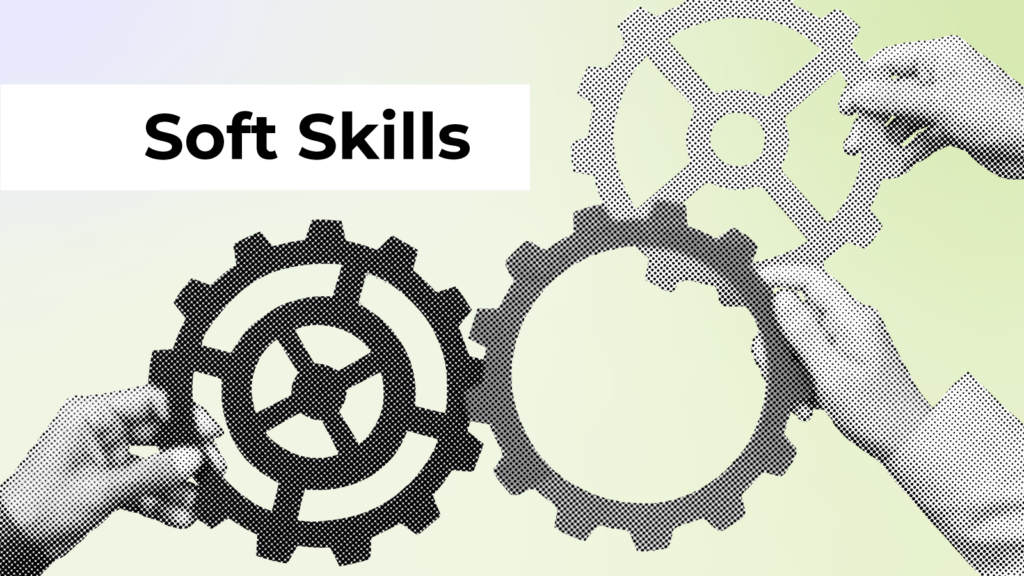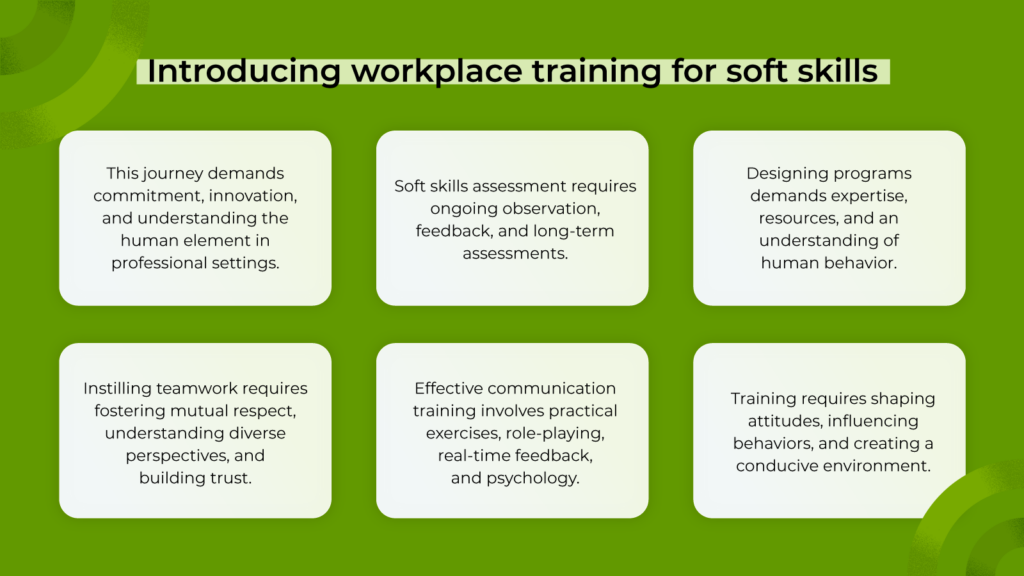Understanding soft skills management for your business

The world of business is more than just numbers, strategies, and technical expertise.
While these hard skills, gained through years of education and hands-on experience, form the backbone of many industries, they aren’t the sole determinants of success.
Over recent years, another set of skills has emerged as equally, if not more, vital. These are often referred to as “soft skills.”
So, what exactly are these “soft skills“? Unlike measurable and specific hard skills, soft skills revolve around interpersonal and intrapersonal dynamics.
They’re about how individuals communicate, collaborate, and connect with colleagues, clients, and stakeholders.
Examples include empathy, adaptability, leadership, problem-solving, and effective communication. These aren’t skills you can necessarily list on a resume with proficiency levels, but they deeply influence how one navigates the professional world.
While hard skills might secure an individual a position in a company, soft skills often determine how they grow within that role, collaborate with teams, and lead projects.
Recognizing their significance, many leading companies and educational institutions are now investing in training programs focused on developing these intangible yet crucial attributes.
As the business environment becomes more dynamic and collaborative, the emphasis on soft skills will only intensify, highlighting the importance of a well-rounded professional skill set.
- What are soft skills?
- Difference between soft skills and hard skills
- The importance of soft skills in the workplace
- Enhancing team collaboration
- Increasing employee retention
- Key soft skills every manager should master
- Communication skills
- Empathy and emotional intelligence
- Problem-solving and critical thinking
- Adaptability and flexibility
- Implementing soft skills training in the workplace
- Assessing the current skill set
- Designing tailored training programs
- Conclusion: The future of soft skills management
- FAQs
What are soft skills?
In the professional realm, there exists a set of skills that doesn’t revolve around technical prowess or academic qualifications.
These are known as “soft skills.” What exactly does this term encompass? Soft skills, sometimes termed interpersonal or people skills, are the attributes that determine how we engage with others, be it in team settings, client interactions, or leadership roles.
They involve the nuanced art of effective communication, the capability to resolve disputes, the sensitivity to understand and respond to others’ feelings, and the ability to foster positive relationships.

While hard skills can be quantified—like proficiency in a programming language or mastery of a particular tool—soft skills remain elusive in their definition.
They don’t fit neatly into checkboxes or scales, making them challenging to evaluate and measure. However, their impact on workplace dynamics, team collaborations, and overall organizational success is undeniable.
As the business world becomes increasingly interconnected and reliant on diverse teams, the emphasis on these intangible attributes continues to grow, highlighting their essential role in a holistic professional toolkit.
Difference between soft skills and hard skills
Envision being a software developer. Your proficiency in programming languages like Python or Java is a hard skill – it’s tangible, quantifiable, and integral to your role.
But, the way you collaborate with colleagues, address disagreements, or navigate through unexpected challenges falls under the domain of your soft skills.
These skills don’t directly relate to coding, but they enhance your overall professional effectiveness, creating a well-rounded and adaptable professional persona.
The importance of soft skills in the workplace
At the heart of every successful company lies a culture anchored in effective interpersonal interactions, and this is where soft skills come into play. Soft skills, encompassing attributes such as communication, teamwork, adaptability, and empathy, are instrumental in creating a harmonious and productive work environment.
Imagine a scenario where every team member is technically proficient but cannot communicate their ideas effectively or empathize with their colleagues.
Such a setting would likely lead to misunderstandings, conflicts, and hindered progress.
On the other hand, when employees possess strong soft skills, they can navigate challenges with ease, collaborate seamlessly, and contribute to a positive workplace atmosphere.
This not only enhances individual job satisfaction but also bolsters team morale and overall organizational health.
In essence, while hard skills might lay the foundational framework for an organization, it’s the soft skills that breathe life into it.
They bridge the gap between individual talents and collective achievement.
In today’s business landscape, soft skills can truly be the catalyst that propels an organization from mere existence to exemplary success, distinguishing a flourishing enterprise from one that’s merely treading water.
Enhancing team collaboration
Central to the success of any group project are the foundational pillars of effective communication, genuine empathy, and cohesive teamwork.
These skills are the linchpins that hold a team together, guiding them toward collective success.
Consider the intricacies of a multifaceted project. Each member brings their unique expertise and perspective to the table.
However, without clear communication, these individual contributions can become disjointed, leading to misaligned goals and inefficiencies.
Effective communication ensures that every team member understands their role, the project’s objectives, and the overarching strategy.
It creates a transparent environment where ideas are shared openly, feedback is constructive, and misunderstandings are minimized.
Empathy, on the other hand, ensures that team members are attuned to each other’s strengths, weaknesses, and emotions.
It fosters an environment of mutual respect and understanding, where individuals feel valued and heard. In such a setting, potential conflicts can be anticipated and resolved amicably, paving the way for a harmonious team dynamic.
Furthermore, when genuine teamwork is in play, the collective strength of the group surpasses the sum of individual efforts.
A cohesive team, bound by trust and shared purpose, can brainstorm creatively, distribute tasks efficiently, and support each other through challenges.
In contrast, a team that lacks these core attributes may find themselves mired in misunderstandings, conflicts, and inefficiencies.
They might possess all the technical expertise in the world, but without seamless communication and collaboration, their potential remains untapped.
In conclusion, while individual skills and expertise are essential components of a team’s arsenal, it’s the seamless interplay of communication, empathy, and teamwork that truly propels a collaborative project to success.
Such a team not only tackles challenges with agility but also fosters an environment where each member thrives and contributes optimally.
Increasing employee retention
The vitality of an organization is significantly influenced by the sense of belonging and recognition employees feel.
When employees believe they are valued and understood, they form a deep connection to the workplace, extending beyond basic duties and aligning with the company’s vision.
Key to fostering this bond are the organization’s leaders.
Their role surpasses mere operational oversight; they are essential touchpoints in an employee’s career.
Effective managers, skilled in interpersonal dynamics, ensure every team member feels valued. Through active listening, feedback, and empathy, they establish a supportive environment where employees flourish.
Positive leadership impacts are vast. It boosts team morale, leading to increased engagement and productivity. In a world with abundant job choices, a strong rapport with supervisors often determines employee loyalty.
Low turnover isn’t just about talent retention; it reflects a workplace conducive to long-term growth.
In summary, while managers need technical and strategic skills, their interpersonal abilities profoundly influence the employee experience.
Organizations that prioritize these soft skills are primed for enduring success.
Key soft skills every manager should master
Soft skills, like interpersonal interactions and problem-solving, are crucial. They enhance the workplace by promoting unity and smooth teamwork. For managers, these skills are even more vital due to their diverse roles.
Beyond overseeing tasks, managers shape team dynamics and morale. Effective communication, which involves clear and timely information sharing, is essential.

Empathy and emotional intelligence play a significant role in understanding team needs, resolving conflicts, and building trust.
Decision-making skills, especially under pressure, define strong leadership. Additionally, in a changing business landscape, adaptability is indispensable. Overall, while many soft skills are valuable, certain ones are fundamental for leaders aiming to inspire and guide their teams effectively.
Communication skills
At the core of their responsibilities lies the crucial task of communication. Without effective communication, even the most well-laid plans and strategies can falter.
Firstly, the ability to convey information clearly is not just about relaying facts or directives. It’s about presenting ideas in a manner that is both comprehensible and compelling.
This clarity eliminates ambiguities, sets clear expectations, and ensures that every team member understands their role within the larger framework.
When information is articulated with precision, it reduces the likelihood of errors, streamlines processes, and fosters a sense of purpose within the team.
Active listening, on the other hand, is an often underemphasized yet vital skill. Managers who truly listen are not just absorbing words but are also attuned to the underlying sentiments, concerns, and ideas of their team members.
This fosters an environment of trust, where employees feel heard and valued. It also provides managers with invaluable insights into team dynamics, potential challenges, and opportunities for innovation.
Moreover, feedback is the bridge that connects performance with growth. Constructive feedback, when delivered thoughtfully, can be a powerful tool for professional development.
It highlights areas of improvement, reinforces positive behaviors, and charts a path for continuous learning.
For managers, it’s not just about pointing out shortcomings but doing so in a manner that is supportive, solution-oriented, and forward-focused.
In essence, effective communication forms the bedrock upon which successful managerial relationships are built.
It aligns individual aspirations with organizational objectives, fosters a culture of transparency, and drives collective progress.
In a world where strategies evolve and goals shift, the consistent thread that keeps teams united and purposeful is the quality of communication emanating from their leaders.
Empathy and emotional intelligence
Individuals contribute not only skills but also personal emotions, aspirations, and motivations to a team. Recognizing these emotional aspects isn’t just about empathy; it’s essential for creating a united and efficient team.
When leaders truly grasp their team’s emotional dynamics, multiple benefits arise. It conveys that employees are appreciated as individuals, boosting morale and instilling a sense of belonging.
Trust, vital in professional relationships, is bolstered when emotions are valued, leading to open communication, idea sharing, and collaborative initiatives. This trust extends both from leaders to employees and among peers.
By being aware of the team’s emotional state, leaders can proactively tackle challenges, from resolving conflicts to supporting during high-stress times or celebrating achievements.
In summary, while skills and strategy are critical in the professional realm, the significance of the human element can’t be overlooked. By acknowledging team emotions, leaders foster robust, resilient, and interconnected professional bonds, setting the stage for shared success.
Problem-solving and critical thinking
From unexpected market shifts and technological disruptions to internal conflicts and resource constraints, hurdles present themselves in various forms.
While these challenges are inherent to any professional journey, the true mettle of an organization is tested not by the absence of problems but by the efficacy with which they are addressed.
At the helm of this problem-solving endeavor often stand the managers.
Managers, by their position, are the first line of defense against these challenges. Their role is not merely to oversee and delegate but to actively engage in finding solutions.
Possessing sharp problem-solving skills is, therefore, not just an asset but a necessity for them.
Firstly, a manager adept at problem-solving can quickly assess a situation, identifying the root causes rather than just the symptoms.
This analytical approach ensures that solutions are not just superficial fixes but address the core of the issue, preventing recurrence.
Furthermore, efficient problem-solving often requires creativity and innovation. Managers with these skills can think outside the box, exploring unconventional solutions and leveraging available resources in novel ways.
This adaptability not only resolves the immediate challenge but also adds a layer of resilience to the team, preparing them for future obstacles.
Additionally, challenges, especially unexpected ones, can cause anxiety and uncertainty within a team. A manager equipped with strong problem-solving abilities can provide stability during such times.
Their confidence in navigating difficulties can be a source of reassurance for the team, fostering a sense of security and cohesion.
In essence, while challenges are par for the course in any professional setting, the presence of managers with honed problem-solving skills can make all the difference.
They ensure that disruptions are not just mitigated but turned into opportunities for growth, learning, and further strengthening the organization’s foundation.
Adaptability and flexibility
The business landscape is ever-evolving, marked by changing markets, technological progress, varying consumer preferences, and swift competition.
In this environment, adaptability stands out as a steadfast necessity, especially for managers bridging strategy and action. This adaptability transcends mere flexibility; it indicates a proactive stance, continuous learning, and staying abreast of changes.
Confronted with unforeseen challenges, adaptable managers don’t adhere to outdated methods. They pivot, ensuring their teams remain progressive and relevant. This openness to change simultaneously nurtures innovation.
A receptive managerial attitude fosters a workspace where creativity flourishes, pushing teams to think creatively and question the norm.
Such a culture often births unique solutions, differentiating the company in a competitive market. Moreover, adaptable managers, attuned to industry changes, can exploit new opportunities, from accessing fresh markets to adopting emerging technologies.
In essence, in today’s dynamic business world, adaptability is key. For managers, it unlocks inventive approaches, opens new horizons, and guarantees enduring growth for their teams and the entire organization.
Implementing soft skills training in the workplace
Soft skills, by their very nature, are multifaceted and deeply rooted in human psychology and behavior. Unlike technical skills, which can often be acquired through structured courses, textbooks, or software tutorials, soft skills development demands a more nuanced approach.
It’s not just about imparting knowledge; it’s about shaping attitudes, influencing behaviors, and cultivating a conducive environment.
Take, for instance, the skill of effective communication. A training program cannot merely consist of lectures on communication techniques.
Instead, it would need to incorporate practical exercises, role-playing scenarios, real-time feedback, and perhaps even elements of psychology to truly make an impact.
Similarly, instilling a sense of teamwork isn’t just about grouping individuals for projects. It’s about fostering mutual respect, understanding diverse perspectives, and building trust.

Designing such intricate training programs requires expertise, resources, and a deep understanding of human behavior.
Moreover, the assessment metrics for soft skills are different from traditional skills. While a technical course might end with an exam or a certification, evaluating the effectiveness of soft skills training is more subtle, often requiring ongoing observation, feedback mechanisms, and long-term assessments.
Furthermore, the dynamic nature of businesses today means that training modules need to be continuously updated. The soft skills deemed essential today might evolve tomorrow, and training programs need to be agile enough to adapt.
In summary, while the business world has come a long way in recognizing the pivotal role of soft skills, the real challenge lies in creating impactful, lasting, and effective training programs.
It’s a journey that demands commitment, innovation, and a deep-seated understanding of the human element in professional settings.
Assessing the current skill set
In the quest to enhance and develop the essential soft skills within an organization, a foundational step is understanding the current landscape.
Just as a physician would first diagnose before prescribing treatment, organizations must assess the existing proficiency levels of their teams before embarking on training programs. This ensures that the training is targeted, relevant, and addresses the actual gaps and needs of the employees.
Surveys are a valuable tool in this diagnostic phase. Well-structured questionnaires, focusing on various aspects of essential soft skills, can provide a broad overview of the team’s strengths and areas of improvement. By anonymously gathering responses, surveys often elicit candid feedback, offering a genuine reflection of the employees’ self-assessment and perception of their soft skills.
Feedback sessions, on the other hand, allow for a more interactive exchange. These can be in the form of group discussions or workshops, where team members can share their experiences, challenges, and observations.
Such sessions are particularly beneficial in understanding the dynamics of the team, identifying common soft skill challenges faced during collaborations, and gathering insights into interpersonal relationships within the organization.
One-on-one discussions provide an even deeper layer of understanding. These personalized interactions, often conducted by managers or HR professionals, offer employees a safe space to discuss their challenges, aspirations, and perspectives on their soft skill competencies. Such discussions can unearth nuanced insights that might not surface in broader surveys or group feedback sessions.
Armed with the data and insights gathered from these methods, organizations can then design training programs that are truly tailored to their needs.
By addressing the specific essential soft skill gaps identified, the training becomes more impactful, leading to tangible improvements in team dynamics, communication, collaboration, and overall organizational productivity.
In essence, recognizing the need for enhancing essential soft skills is just the beginning. The real magic happens when organizations take proactive steps to understand their current landscape, using tools like surveys, feedback sessions, and one-on-one discussions, ensuring that the subsequent training is both relevant and effective.
Designing tailored training programs
Every individual enters an organization with a unique blend of experiences, skills, aspirations, and learning styles. While standardized training programs might offer a broad foundation, they often fall short in addressing the nuanced needs and potential of each team member.
Tailored training programs, on the other hand, offer a more personalized approach to professional growth.
By taking into account an individual’s strengths and pinpointing specific areas of improvement, these customized programs can provide targeted learning experiences that resonate more deeply with the participant.
For instance, while one employee might excel in technical skills but struggle with communication, another might have strong leadership potential that simply needs refining and direction.
A blanket training approach might not cater effectively to either of these needs. However, a program specifically designed around these unique profiles ensures that each individual receives the guidance and resources best suited to their developmental journey.
Furthermore, tailored training acknowledges and respects the individuality of each team member. It sends a powerful message that the organization is invested not just in generic employee improvement, but in the specific growth and success of each person.

This can boost morale, increase engagement, and foster a deeper sense of loyalty and commitment to the organization.
In addition, customized training programs can also be more time-efficient. Instead of sifting through irrelevant material or modules that don’t align with their needs, employees can focus on targeted content, leading to faster skill acquisition and more immediate application in their roles.
In essence, while generic training programs provide a broad overview and can serve as a starting point, the real transformative potential lies in tailored programs.
Recognizing the unique strengths and areas of growth for each individual and crafting training experiences around them ensures not only better results but also cultivates an environment where every team member feels valued, understood, and empowered to reach their fullest potential.
Conclusion: The future of soft skills management
Mastery of specific skills, domain knowledge, and hands-on experience form the tangible foundation upon which industries and professions are built.
However, the intricate tapestry of an organization’s success isn’t woven from technical prowess alone. Interwoven with these hard skills are the equally, if not more, significant soft skills, which breathe life and dynamism into the workplace.
Soft skills, often seen as the human side of professional competence, are the subtle yet powerful forces that drive interpersonal interactions, shape team dynamics, and influence decision-making processes. They encapsulate attributes like effective communication, emotional intelligence, adaptability, and leadership. In the absence of these skills, even the most technically adept teams can falter in their objectives.
Collaboration, a cornerstone of any successful organization, heavily relies on these soft skills. It’s not just about pooling together diverse skills but ensuring that they synergize.
Effective communication, mutual respect, and active listening enable teams to align their visions, share ideas without friction, and work towards common goals with a unified spirit.

In the face of challenges, it’s often soft skills like innovative thinking, resilience, and critical problem-solving that come to the fore.
While technical knowledge might provide the tools, it’s the soft skills that guide their application, ensuring solutions are not only effective but also holistic and sustainable.
Furthermore, the ambiance of a workplace, which plays a crucial role in employee satisfaction and retention, is largely shaped by these intangible skills.
Empathy, understanding, and positive reinforcement contribute to a culture where individuals feel valued, heard, and motivated to contribute their best.
In summary, while the significance of technical expertise remains undeniable, the spotlight on soft skills is both warranted and essential.
They are the unsung heroes, the silent catalysts that transform a group of skilled individuals into a cohesive, innovative, and thriving organization.
Recognizing and nurturing these skills is the key to unlocking unparalleled success in the ever-evolving professional landscape.
Discover how DevSkiller can help you master soft skills management.
Schedule a demo with one of our product experts or watch this quick 5-min demo video to find out more.
FAQs
- What are some examples of soft skills?
Examples include communication, teamwork, adaptability, problem-solving, and emotional intelligence. - How can I improve my soft skills?
Practice active listening, seek feedback, engage in role-playing exercises, and consider professional training programs. - Why are soft skills crucial for managers?
They foster effective communication, enhance team collaboration, and lead to innovative problem-solving. - Can soft skills be learned?
Absolutely! With practice, feedback, and the right training, anyone can enhance their soft skills.
How do soft skills differ from hard skills?
While hard skills are specific and measurable abilities related to a job (e.g., coding), soft skills are intangible interpersonal skills.
Share post